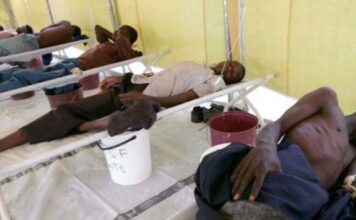The Nigeria Centre for Disease Control and Prevention has issued a cautionary statement regarding the potential rise in cholera outbreaks throughout the country as the rainy season progresses.
In its announcement on Thursday, signed by the Director General, Dr. Jide Idris, the NCDC highlighted that between January 1st and June 11th, 2024, there have been 1,141 suspected and 65 confirmed cases of cholera, resulting in 30 fatalities reported across 96 Local Government Areas in 30 states.
The agency pointed out that the states significantly affected by the cholera burden include Bayelsa, Zamfara, Abia, Cross River, Bauchi, Delta, Katsina, Imo, Nasarawa, and Lagos.
Moreover, the NCDC mentioned the establishment of a collaborative National Cholera Technical Working Group, comprising various bodies such as the Federal Ministries of Environment and Water Resources, the National Primary Health Care Development Agency, the World Health Organization, the United Nations Children’s Fund, and other partners, offering assistance to the impacted states.
The Nigerian government’s disease control agency warns of a heightened risk of cholera outbreaks nationwide as the rainy season advances, emphasizing the need for vigilance and preparedness to prevent a surge in cases .
He mentioned, “This support includes risk communication, active case search, laboratory diagnosis, case management, provision of response commodities, water sanitation and hygiene interventions, and dissemination of Cholera awareness jingles in English and local languages.”
Wakadaily reports that Cholera is an illness that spreads through contaminated food and water.
The bacteria Vibrio cholerae is usually the cause of the infection. The bacteria can enter the water supply through the feces of someone who has the infection. The water can then become contaminated during transport, at the source, or when stored at home.
Additionally, food can become contaminated if someone who has the bacteria on their hands touches it while it’s being prepared or eaten .
“Beverages prepared with contaminated water and sold by street vendors, ice, and even commercial bottled water have been implicated as vehicles of transmission, as have cooked vegetables and fruits freshened with untreated wastewater.
“The time between infection and the appearance of symptoms is two hours to five days. It has a higher risk of transmission in areas that lack adequate sanitation facilities and a regular supply of clean water. Unsafe practices such as improper disposal of refuse and open defecation endanger the safety of water used for drinking and personal use,” NCDC highlighted.
Symptoms of cholera may include sudden onset of profuse, painless watery diarrhea, vomiting, nausea, and fever. Severe cases can lead to death due to dehydration, but many infected individuals may only show mild or no symptoms.
The NCDC identified groups at highest risk for cholera as those living in areas with limited access to clean water, poor sanitation, and poor hygiene, as well as individuals in overcrowded or unsanitary environments.
The disease can be easily treated if detected early, with oral rehydration solution and antibiotics.
Prevention measures include access to clean drinking water, proper sanitation, and good hygiene practices like handwashing.
The NCDC recommended that individuals decrease the chance of contracting cholera by boiling and storing water in a clean, covered container before drinking, and by maintaining good personal hygiene through frequent handwashing with soap and clean water or using hand sanitizer if necessary.
It also suggested ensuring that food is thoroughly cooked, protecting food and water from flies and contamination, reheating leftovers before consumption, avoiding open defecation and improper waste disposal, and regularly clearing sewage.
Additionally, healthcare workers should adhere to standard safety precautions and heighten surveillance to identify potential cholera cases.
The NCDC encouraged state governments to prioritize initiatives that promote access to safe water, proper sanitation, and good hygiene practices in communities.
“As the NCDC continues to work with partners to lead the health-sector response to cholera outbreaks, we call for an urgent improvement in access to clean water, proper sanitation, and hygiene,” it highlighted.
